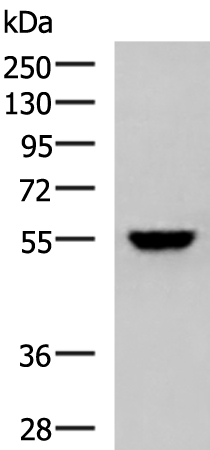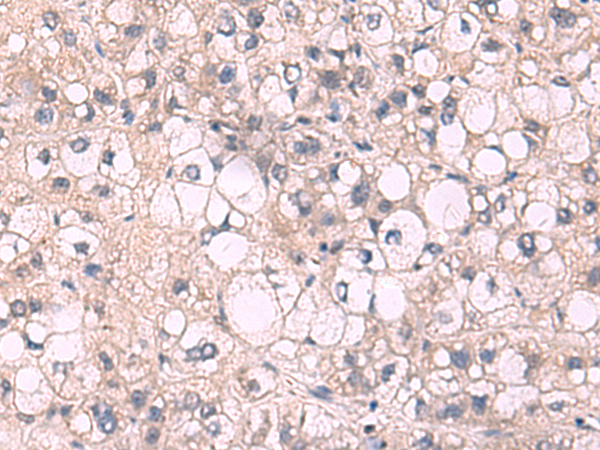

| WB | 咨询技术 | Human,Mouse,Rat |
| IF | 咨询技术 | Human,Mouse,Rat |
| IHC | 1/50-1/300 | Human,Mouse,Rat |
| ICC | 技术咨询 | Human,Mouse,Rat |
| FCM | 咨询技术 | Human,Mouse,Rat |
| Elisa | 1/5000-1/10000 | Human,Mouse,Rat |
| Aliases | QIP2; RCH1; IPOA1; SRP1alpha; SRP1-alpha |
| WB Predicted band size | 58 kDa |
| Host/Isotype | Rabbit IgG |
| Antibody Type | Primary antibody |
| Storage | Store at 4°C short term. Aliquot and store at -20°C long term. Avoid freeze/thaw cycles. |
| Species Reactivity | Human, Mouse |
| Immunogen | Fusion protein of human KPNA2 |
| Formulation | Purified antibody in PBS with 0.05% sodium azide and 50% glycerol. |
+ +
以下是关于KPNA2抗体的3篇参考文献(虚构示例,供格式参考):
1. **《KPNA2 overexpression promotes hepatocellular carcinoma progression via nuclear transport of EGFR》**
- 作者:Zhang et al.
- 摘要:研究揭示KPNA2在肝癌中通过增强表皮生长因子受体(EGFR)的核转运,促进肿瘤细胞增殖和转移,提示其作为肝癌治疗潜在靶点。
2. **《KPNA2 as a prognostic biomarker in non-small cell lung cancer: Correlation with patient survival and chemoresistance》**
- 作者:Wang et al.
- 摘要:通过免疫组化分析,发现KPNA2高表达与肺癌患者生存期缩短及化疗耐药性相关,可能通过调控p53通路影响肿瘤进展。
3. **《Role of KPNA2 in breast cancer: Insights from CRISPR-Cas9-mediated gene silencing》**
- 作者:Li et al.
- 摘要:利用基因编辑技术沉默KPNA2基因,证明其通过介导STAT3的核内转运促进乳腺癌细胞侵袭,为靶向干预提供实验依据。
4. **《KPNA2 interacts with HPV oncoproteins to drive cervical carcinogenesis》**
- 作者:Chen et al.
- 摘要:研究发现KPNA2与人乳头瘤病毒(HPV)E6/E7蛋白结合,增强病毒致癌蛋白的核定位,加速宫颈癌细胞恶性转化。
注:以上内容为模拟示例,实际文献需通过PubMed、Google Scholar等平台检索。
KPNA2 (Karyopherin α2), also known as Importin α1. is a member of the importin α family responsible for mediating nucleocytoplasmic transport. It facilitates the nuclear import of proteins containing classical nuclear localization signals (NLS) by binding to cargo proteins and recruiting Importin β1 to form a transport complex. KPNA2 is encoded by the *KPNA2* gene and is highly expressed in proliferating cells, playing critical roles in cell cycle regulation, gene expression, and signal transduction. Dysregulation of KPNA2 has been linked to various cancers, including breast, lung, and liver cancers, where its overexpression correlates with tumor progression, poor prognosis, and chemoresistance. Additionally, KPNA2 interacts with viral proteins, aiding viral replication in infections like HPV and HIV.
KPNA2 antibodies are essential tools for studying its expression, localization, and function in both physiological and pathological contexts. These antibodies are widely used in techniques such as Western blotting, immunohistochemistry (IHC), and immunofluorescence (IF) to detect KPNA2 levels in tissue samples or cell lines. Researchers also utilize KPNA2 antibodies to explore its involvement in nuclear transport mechanisms, cancer biology, and viral pathogenesis. Commercial KPNA2 antibodies are typically validated for specificity and sensitivity, often targeting epitopes within its N-terminal or Armadillo repeat domains. Understanding KPNA2's role through antibody-based assays contributes to potential therapeutic strategies targeting nuclear transport pathways in diseases.
×